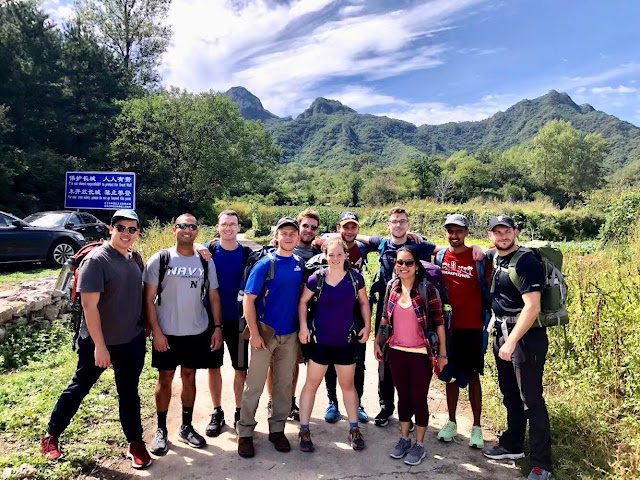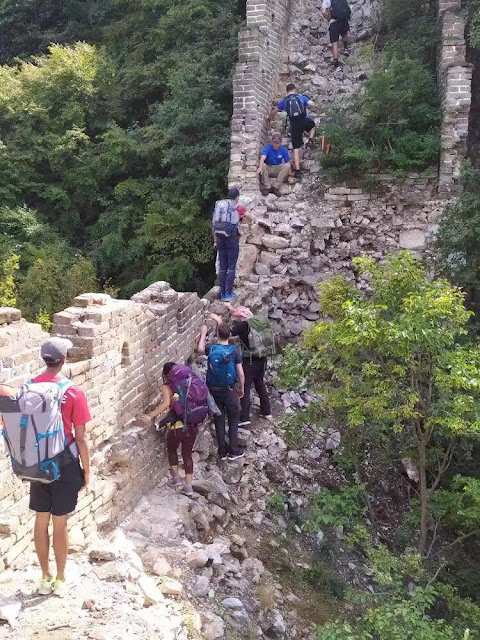"Climb the mountain so you can see the world, not so the world can see you." -David McCullough
This past weekend, I had a great opportunity to join a group of amazing people from Schwarzman Scholars Program on their overnight trip to hiking up the Jiankou Great Wall, one of the most dangerous and wild yet the most beautiful Great Wall sections. I am writing to document a great memory in words -- to feel this thrill, joy and contentment again in the future. It was an incredible adventure filled with sunshines, good laughs, meaningful conversations, kindness of people, comforting camp food, some stars, the beautiful full moon and boom fire -- and all the sweats, hard work and positivities to get through a very challenging path of the Great Wall. I could not have asked for more.
Before the trip:
Even though Myanmar is a very beautiful place, due to a lack of proper infrastructures and conflicts in some places, sadly, we do not have much access to many of its beautiful places where we can go hiking or trekking. So I have not been hiking for quite a while. When I heard a friend talking about hiking to the Great Wall, I did not even think much and asked him if I could join. Thankfully, these people didn't mind me tagging along.
The group had a few meetings before the trip -- informing about the trail, what to expect and what you need to bring for the trip etc. I was warned that it would be quite brutal. However, as an adrenaline junkie as I am, my hunger for this new adventure far more exceeded my aversion towards pain. Life would be quite boring if we live in our comfort zones all the time - you will never find out what you are capable of unless you keep pushing yourself a little more every now and then.
We went shopping for gears and food a day before the trip. The preparation was so thorough that I knew it would be an amazing trip. I packed going through the checklist and I cautiously packed some light extra layers in case it got cold up there. (Recently, in April, I went up to the Mount Sinai in Egypt, no one told us how cold it would be up there during the night. We took the camel ride up there at 2am to catch the sunrise at 5:30am. The cold was brutal and it was difficult to enjoy the beautiful sunrise over the mountain ranges up on the top.)
During the trip:
Saturday:
On Saturday morning before 8am, I met up with the group at the Dongzhimen Bus Hub. From there we took a bus to the outskirt of Beijing that is close to the trail head we wanted to go. After we got off, we took a taxi that would drop us off at the trail head.
Group picture right before starting the hike
Around noon, from there we started our journey. Half hour into the hike, I started realizing that I never carried this much heavy backpack before because in the past hiking trips, we usually have some access to water or we bring the water purifier with us. I started doubting if I could make it with this heavy pack. But, also the first half hour of the hiking is always the most difficult one physically because your body starts adjusting the sudden change in exerted pressure and additional use of muscle strengths you don't need in normal days sitting and walking.
Not before an hour into the hike, we faced our first adversary - the steep rocky wall! Following the careful instructions, we beat our first opponent :)
As we hiked along, we started seeing the breathtaking scenes of mountain ranges and the wall along, and forgot all the struggles and felt rejuvenated again. It was all worth it. The one thing I wished I did was to have learned a bit of historical context about the Wall before going on the trip. That would make it more mentally stimulating.
The combination of the heavy backpacks and the difficulty level of the trail slowed us down a bit - at least it was the case for me. Later, one of the trip leads helped me repack my backpack to have better weight redistribution (Thanks a lot Eva!). It was much better to walk after that!
Half of the hike was climbing rough and steep slopes of the Wall. There was a time I felt that "just one mis-step or a slip, I could die." A mix of fear and amazement on taking the risk was exhilarating -- at the face of the risk of death, I felt fully alive!
So we took longer than we planned to reach the destination to camp for the night but we managed to find a good watchtower. It was so awesome to have camped inside the abandoned ancient watchtower! But, I can only imagine that it was not so awesome for those ancient soldiers who slept on the watchtower...
We were able to catch a breathtakingly beautiful sunset over the range of mountains and the Wall.
After the strenuous hiking half the day, we were all starving. We started preparing some basic comfort food (I suppose we were so hungry and busy eating that we didn't take any pictures of our dinner :)) Everything tasted so delicious - gummy bears, PB&J with tortillas, Chinese preserved meats, cheese, popcorns etc.
After dinner we hanged out on the top of the watchtower, chilling and listening to a playlist of lovely country music (which took me back to good memories of my college years in Colorado.) I was hoping to see stars up the sky but it was a day after the full moon so we instead saw a beautiful (nearly) full moon! It was cloudy a bit earlier but it brightened up as the night went by and a few stars came out too.
Sunday:
We decided to wake up early to catch the sunrise. In the morning, this was the scene I woke up to! The moon was still up there at 5:30am.
the breakfast to fuel for the rest of the hike for the day
After breakfast, we headed out to finish the hike. We later split into two groups - one decided to make a full loop and the other to take a shortcut back. For us who took the shortcut passed through the touristy part of the Great Wall. After being in the Wild for a day, it was a bit shocking to see so many tourists with all kinds of fashions to make great photos with the Wall. By that time, I was already quite beaten up.
And for the last part, we took the slides to go down! That was quite fun. We then met up with the other group who made the loop and had lunch and headed back to our campuses.
It was the most physically and mentally challenging hiking trip I had ever done, making me feel so accomplished. Every time we took a look back, we were amazed by how far we had come! Each and every step counts, so does every moment filled by the beauty of the nature and the wonderful spirit of the people who treasure it.




















